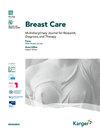TP53 gene polymorphism at codon 72 as a response predictor for neoadjuvant chemotherapy
IF 2.1
4区 医学
Q2 OBSTETRICS & GYNECOLOGY
引用次数: 0
Abstract
Introduction: Breast cancer is one of the most prevalent cancers in women worldwide and neoadjuvant chemotherapy is a favored method for achieving pathologic complete response (pCR). The TP53 gene is involved in inducing the response to chemotherapy drugs. Objectives: The present study sought to correlate polymorphism variants at codon 72 with pathologic complete response to neoadjuvant chemotherapy. Casuistry and Methods: The study was conducted in the state of Sergipe, in Northeastern Brazil. A total of 206 patients with a histopathological diagnosis of breast cancer who underwent neoadjuvant chemotherapy from 2019 to 2022 were included. DNA samples were collected for the evaluation of TP53 polymorphism at codon 72. A prospective evaluation of the cases was conducted to verify the surgical pathologic response after chemotherapy; the response evaluation criteria in solid tumors were used (RECIST). The study was approved by the University of São Paulo Ethics and Research Committee. Results: Of the 168 patients, 44.6% were Arg72Arg, 17.3% Pro72Pro, and 38.0% Arg72Pro; pCR was achieved in 21.4% of the patients; 10.1% had progressive disease, 13.7% stable disease, and 54.2% had a partial pathologic response. The only predictor of pCR in multivariate regression was immunohistochemistry (p < 0.001). In the multivariate analysis, Arg72Pro and Pro72Pro increased the odds of the patient evolve with stable disease.This study was innovative in demonstrating a predictor of stable disease in response to neoadjuvant chemotherapy Conclusion: TP53 polymorphism at codon 72 is not a predictor of pathologic complete response, but it can be a predictor of stable disease.作为新辅助化疗反应预测因子的 TP53 基因 72 号密码子多态性
简介乳腺癌是全球妇女中发病率最高的癌症之一,新辅助化疗是获得病理完全反应(pCR)的首选方法。TP53 基因参与诱导对化疗药物的反应:本研究试图将密码子 72 的多态性变异与新辅助化疗的病理完全反应相关联:研究在巴西东北部的塞尔希培州进行。共纳入了 206 名经组织病理学诊断为乳腺癌的患者,这些患者在 2019 年至 2022 年期间接受了新辅助化疗。采集的DNA样本用于评估TP53第72密码子的多态性。对病例进行前瞻性评估,以核实化疗后的手术病理反应;采用实体瘤反应评估标准(RECIST)。该研究获得了圣保罗大学伦理与研究委员会的批准:168名患者中,44.6%为Arg72Arg型,17.3%为Pro72Pro型,38.0%为Arg72Pro型;21.4%的患者获得了pCR;10.1%的患者病情进展,13.7%的患者病情稳定,54.2%的患者获得了部分病理反应。在多变量回归中,免疫组化是预测 pCR 的唯一指标(p < 0.001)。在多变量分析中,Arg72Pro和Pro72Pro增加了患者病情稳定的几率:结论:TP53 第 72 个密码子的多态性不能预测病理完全反应,但可以预测病情稳定。
本文章由计算机程序翻译,如有差异,请以英文原文为准。
求助全文
约1分钟内获得全文
求助全文
来源期刊

Breast Care
医学-妇产科学
CiteScore
4.40
自引率
4.80%
发文量
45
审稿时长
6-12 weeks
期刊介绍:
''Breast Care'' is a peer-reviewed scientific journal that covers all aspects of breast biology. Due to its interdisciplinary perspective, it encompasses articles on basic research, prevention, diagnosis, and treatment of malignant diseases of the breast. In addition to presenting current developments in clinical research, the scope of clinical practice is broadened by including articles on relevant legal, financial and economic issues.
 求助内容:
求助内容: 应助结果提醒方式:
应助结果提醒方式:


